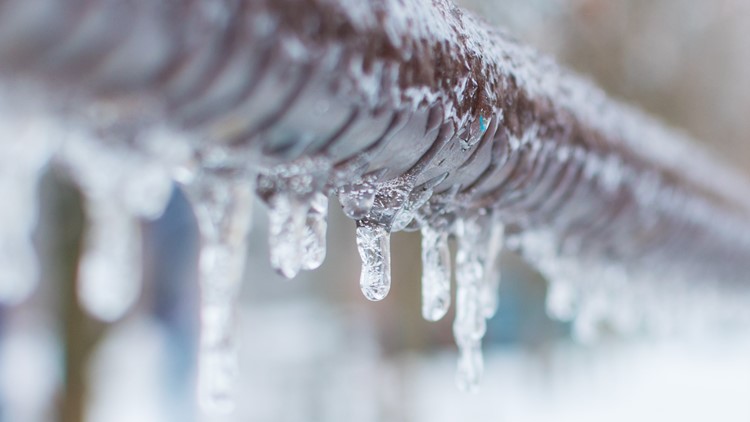Just about every person is bound to have their unique rationale on the subject of Winter Plumbing Precautions: Preventing Frozen Pipes.
:strip_icc()/snow-outdoor-faucet-pipes-4af65d1e5e904fb1aa7bf74071fe5d89.jpg)
Cold weather can ruin your pipes, especially by freezing pipes. Right here's just how to avoid it from taking place and what to do if it does.
Introduction
As temperatures drop, the danger of frozen pipes boosts, potentially causing pricey fixings and water damages. Recognizing just how to stop icy pipelines is vital for home owners in cool climates.
Avoidance Tips
Insulating susceptible pipelines
Cover pipes in insulation sleeves or utilize heat tape to safeguard them from freezing temperatures. Focus on pipes in unheated or outside locations of the home.
Heating methods
Maintain indoor spaces appropriately heated up, particularly areas with pipes. Open cabinet doors to allow cozy air to flow around pipes under sinks.
Exactly how to recognize icy pipelines
Seek lowered water circulation from taps, uncommon smells or sounds from pipelines, and visible frost on subjected pipes.
Long-Term Solutions
Structural modifications
Think about rerouting pipes away from exterior wall surfaces or unheated locations. Add extra insulation to attics, cellars, and crawl spaces.
Updating insulation
Purchase top quality insulation for pipes, attic rooms, and walls. Appropriate insulation helps keep constant temperature levels and minimizes the risk of frozen pipelines.
Shielding Exterior Pipes
Garden pipes and outside taps
Disconnect and drain yard tubes before wintertime. Mount frost-proof faucets or cover outdoor faucets with protected caps.
Recognizing Icy Pipelines
What causes pipes to freeze?
Pipes freeze when exposed to temperatures below 32 ° F (0 ° C) for prolonged periods. As water inside the pipes freezes, it broadens, putting pressure on the pipe walls and potentially causing them to break.
Threats and problems
Icy pipes can result in supply of water interruptions, residential property damages, and expensive repairs. Ruptured pipelines can flood homes and cause considerable structural damage.
Indicators of Frozen Water Lines
Recognizing icy pipes early can stop them from rupturing.
What to Do If Your Pipelines Freeze
Immediate actions to take
If you suspect icy pipes, maintain taps available to eliminate stress as the ice thaws. Make use of a hairdryer or towels taken in hot water to thaw pipelines gradually.
Conclusion
Stopping icy pipes requires positive actions and fast responses. By comprehending the causes, indicators, and preventive measures, house owners can safeguard their plumbing during cold weather.
Helpful Tips to Prevent Frozen Pipes this Winter
UNDERSTANDING THE BASICS: WHY PIPES FREEZE AND WHY IT’S A PROBLEM
Water freezing inside pipes is common during the winter months, but understanding why pipes freeze, and the potential problems it can cause is crucial in preventing such incidents. This section will delve into the basics of why pipes freeze and the associated problems that may arise.
THE SCIENCE BEHIND FROZEN PIPES
When water reaches freezing temperatures, it undergoes a physical transformation and solidifies into ice. This expansion of water as it freezes is the primary reason pipes can burst. As the water inside the pipe freezes, it expands, creating immense pressure on the walls. If the pressure becomes too great, the pipe can crack or rupture, leading to leaks and water damage.
FACTORS THAT CONTRIBUTE TO PIPE FREEZING
Low Temperatures: Extremely cold weather, especially below freezing, increases the risk of pipes freezing. Uninsulated or Poorly Insulated Pipes: Pipes located in unheated areas, such as basements, crawl spaces, or attics, are more prone to freezing. Insufficient insulation or lack of insulation altogether exacerbates the problem. Exterior Wall Exposure: Pipes running along exterior walls are susceptible to freezing as they encounter colder temperatures outside. Lack of Heating or Temperature Regulation: Inadequate heating or inconsistent temperature control in your home can contribute to frozen pipes. PROBLEMS CAUSED BY FROZEN PIPES
- Pipe Bursting: As mentioned earlier, the expansion of water as it freezes can cause pipes to burst, resulting in significant water damage.
- Water Damage: When pipes burst, it can lead to flooding and water damage to your property, including walls, ceilings, flooring, and personal belongings.
- Structural Damage: Prolonged exposure to water from burst pipes can compromise the structural integrity of your home, leading to costly repairs.
- Mold and Mildew Growth: Excess moisture from water damage can create a favorable environment for mold and mildew growth, posing health risks to occupants.
- Disrupted Water Supply: Frozen pipes can also result in a complete or partial loss of water supply until the issue is resolved.
WHY CERTAIN PIPES ARE MORE PRONE TO FREEZING
- Location: Pipes located in unheated or poorly insulated areas, such as basements, crawl spaces, attics, or exterior walls, are at higher risk of freezing.
- Exterior Pipes: Outdoor pipes, such as those used for irrigation or exposed plumbing, are particularly vulnerable to freezing as they are directly exposed to the elements.
- Supply Lines: Pipes that carry water from the main water supply into your home, including the main water line, are critical to protect as freezing in these lines can affect your entire plumbing system.
- Underground Pipes: Pipes buried underground, such as those connected to sprinkler systems or outdoor faucets, can be susceptible to freezing if not properly insulated.
https://busybusy.com/blog/helpful-tips-to-prevent-frozen-pipes-this-winter/

I was shown that article on Winter Plumbing Precautions: Preventing Frozen Pipes through a pal on our other site. So long as you appreciated our post plz be sure to pass it around. Thank-you for taking the time to read it.
Schedule A Service